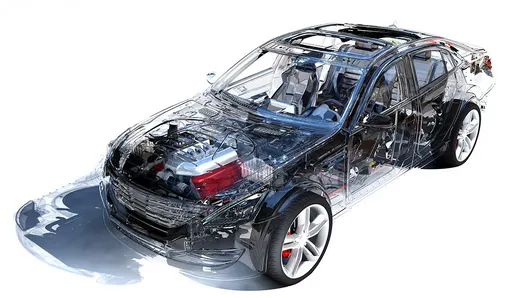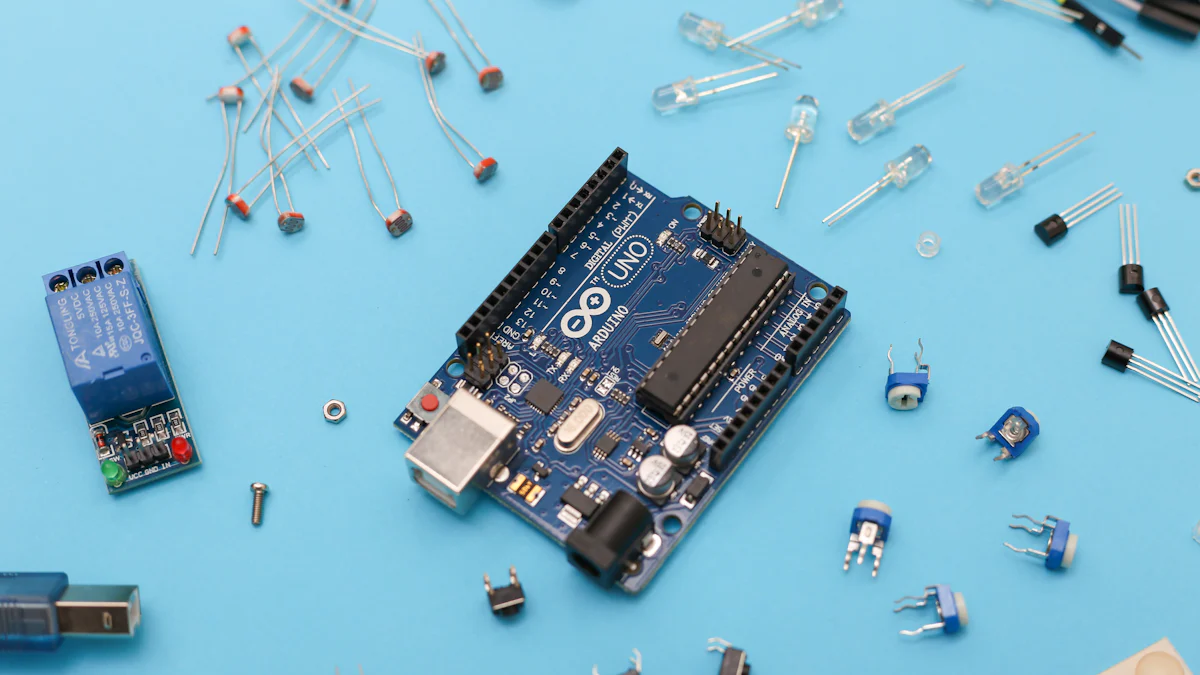
In today’s highly intelligent automotive industry, the Microcontroller Unit (MCU) undoubtedly serves as its central nervous system, governing a multitude of critical vehicle functions. From engine management to Advanced Driver-Assistance Systems (ADAS), all rely on its efficient and stable operation. Among the numerous automotive-grade MCUs, the MC9S12DJ256MFUE from NXP (formerly Freescale) has long been a trusted choice for engineers. As an engineer with extensive hands-on experience in the automotive electronics field, I will delve into the appeal and value of this classic MCU from multiple perspectives, including technical details, practical applications, and future outlook.
MC9S12DJ256MFUE: Classic Architecture and Exceptional Performance
The MC9S12DJ256MFUE belongs to NXP’s HCS12 family, a microcontroller built around a 16-bit CPU core. Its core advantages lie in its balanced performance, rich set of peripheral interfaces, and exceptional reliability, characteristics that enable it to excel in harsh automotive environments.
Core Technical Specifications
-
16-bit HCS12 CPU: The HCS12 CPU is a processor specifically designed by NXP for high-performance embedded applications, featuring an efficient instruction set and powerful bit-manipulation capabilities. For automotive control systems, this translates to faster real-time response and more precise execution of control algorithms. For instance, within an Engine Control Unit (ECU), the HCS12 CPU can process sensor data with microsecond-level precision and swiftly adjust fuel injection and ignition timing, ensuring optimal engine performance and emission standards under all operating conditions.
-
256KB Flash EEPROM: The 256KB of on-chip Flash memory provides ample space for complex automotive software. Modern automotive software encompasses not only basic control logic but also diagnostic routines, fault code storage, Over-The-Air (OTA) update firmware, and extensive calibration data. Sufficient Flash space allows developers to integrate more advanced features, such as complex in-vehicle network protocol stacks (CAN, LIN, FlexRay), functional safety modules (code related to ISO 26262), and user-defined applications. In a practical project, I utilized this Flash memory to implement a lookup table-based torque control algorithm while reserving sufficient space for subsequent feature expansion and parameter optimization.
-
8KB RAM: Although relatively modest by modern standards, this is adequate for a Real-Time Operating System (RTOS) and the storage of critical variables. In the design phase, careful memory planning is essential, placing frequently accessed data and stacks in RAM to maximize CPU execution efficiency.
-
Wide Operating Temperature Range: The industrial-grade temperature range of -40°C to 125°C is a key factor in the MC9S12DJ256MFUE’s foothold in the automotive sector. Whether during cold starts in frigid winters or in the high-temperature environment of the engine bay, it maintains stable and reliable operation. I participated in a project for vehicles in cold regions where the MC9S12DJ256MFUE performed flawlessly in startup tests at -30 degrees Celsius.
-
Rich Communication Interface Set: This MCU integrates multiple CAN, SCI (UART), and SPI communication modules. The CAN bus is the backbone of automotive electronic networks, and the multiple CAN modules in the MC9S12DJ256MFUE facilitate easy implementation of multi-channel CAN communication, supporting data exchange between different domain controllers within the vehicle. For example, it can simultaneously handle data streams from the Body Control Module, Powertrain Controller, and instrument cluster, enabling real-time synchronization and interaction of information.
-
QFP Package: The Quad Flat Package (QFP) is a common form factor in automotive electronics, offering ease of soldering and integration onto PCB boards, along with good thermal dissipation properties, which are crucial for the miniaturization and reliability of automotive electronic modules.

Practical Application Cases and Experience Sharing
Due to its robust functionality and stability, the MC9S12DJ256MFUE is widely used in numerous automotive subsystems. Below are some typical application scenarios from my personal experience or knowledge:
1. Engine Control Unit (ECU)
In the ECU, the MC9S12DJ256MFUE is responsible for acquiring data from sensors such as the crankshaft position, camshaft position, oxygen sensor, and knock sensor. Based on predefined engine models, it precisely calculates fuel injection quantity, ignition advance angle, and throttle opening. Its 16-bit architecture and real-time processing capabilities ensure the engine operates efficiently and stably across all speed and load ranges. I used this MCU to develop a common-rail injection control system for a diesel engine, achieving lower fuel consumption and reduced emissions through precise control of injector opening times.
2. Body Control Module (BCM)
The BCM is the core of vehicle comfort and convenience, controlling functions like power windows, door locks, lighting, and wipers. The General-Purpose Input/Output (GPIO) ports and timer modules of the MC9S12DJ256MFUE can be flexibly configured to achieve precise control over these actuators. For instance, using the Pulse-Width Modulation (PWM) functionality enables seamless dimming of interior ambient lighting, enhancing the passenger experience.
3. Instrument Cluster and Display Systems
Modern automotive instrument clusters have transitioned from traditional mechanical gauges to fully digital displays. The MC9S12DJ256MFUE can serve as the main control chip for the cluster, processing vehicle data (such as speed, RPM, fuel level) received via the CAN bus and driving LCD/TFT displays through SPI or parallel interfaces to present real-time vehicle information. Its processing power also supports basic graphics rendering and animation effects.
4. Battery Management System (BMS)
In Electric Vehicles (EVs) and Hybrid Electric Vehicles (HEVs), the BMS is critical for ensuring the safe and efficient operation of the battery pack. The MC9S12DJ256MFUE can be used to monitor individual cell voltages and temperatures, estimate the State of Charge (SOC) and State of Health (SOH), and execute cell balancing strategies. Its communication interfaces enable data exchange with high-voltage controllers and charging stations, ensuring the safety and reliability of the entire charging and discharging process.
Comparison with Competing Products and Selection Criteria
During MCU selection, it is common practice to compare it with devices from the same family or competing products. Understanding these differences helps in making the most suitable choice for project requirements.
MC9S12DJ256MFUE vs. MC9S12A128CFUE
These two MCUs belong to the same HCS12 family, with the primary difference being Flash memory capacity. The MC9S12DJ256MFUE features 256KB of Flash, while the MC9S12A128CFUE has 128KB. Functionally, the DJ256MFUE typically supports a richer set of peripherals, giving it an advantage when handling more complex tasks and integrating more features. If the project demands high code size and functional extensibility, the DJ256MFUE is the more robust choice; for cost-sensitive or functionally simpler applications, the A128CFUE is also competent.
MC9S12DJ256MFUE vs. MC9S12XET256MAA
The MC9S12XET256MAA is a member of the HCS12X series, which introduces the XGATE co-processor module compared to the HCS12 series. The XGATE is an independent RISC processor that can offload I/O and peripheral handling tasks from the main CPU, significantly enhancing overall system performance and real-time responsiveness. Although both share the same Flash capacity, the XET256MAA performs better when managing high-concurrency I/O and complex communication protocols. If a project requires ultimate real-time response or must process large data streams (e.g., sensor fusion in ADAS), the XET256MAA would be a superior choice. However, the inclusion of XGATE also increases development complexity, requiring a deeper understanding of parallel processing from the developer.
Market Alternatives
Beyond NXP’s own products, alternative solutions exist from manufacturers like Texas Instruments (TI) and Microchip. TI’s Hercules series MCUs are renowned for their robust functional safety features and high-performance ARM Cortex-R cores, making them suitable for the highest safety integrity levels like ASIL-D. Microchip’s PIC series offers advantages in low power consumption and cost-effectiveness for certain specific applications. The final choice of MCU ultimately depends on the project’s specific requirements, budget, development timeline, and the team’s technical expertise.
Outlook and Summary
Although automotive electronics technology is rapidly evolving, with ARM Cortex-M/R series MCUs dominating in terms of performance and ecosystem, the MC9S12DJ256MFUE, by virtue of its mature and stable architecture, extensive automotive-grade certifications, and broad application base, continues to play an indispensable role in many traditional automotive control domains. For engineers new to the field, mastering development techniques for the HCS12 family of MCUs is a valuable step towards understanding the underlying logic of automotive electronics and accumulating practical experience.
As an engineer, I fully understand the importance of selecting the right MCU for a project’s success. The MC9S12DJ256MFUE is more than just a chip; it is the crystallization of the wisdom and experience of countless automotive engineers. It has left a profound mark on the evolution of automotive electronics and will continue to contribute its value in the automotive world of the future.
References:
[1] NXP Semiconductors. (n.d.). *S12 MagniV® Microcontrollers*. Retrieved from [https://www.nxp.com/products/processors-and-microcontrollers/power-architecture-processors/s12-magniv-microcontrollers:S12-MAGNIV](https://www.nxp.com/products/processors-and-microcontrollers/power-architecture-processors/s12-magniv-microcontrollers:S12-MAGNIV)
[2] NXP Semiconductors. (n.d.). *MC9S12DJ256MFUE Datasheet*. (Specific datasheet link not available in original article, general product family link provided)
See Also
Uncover Key Features of MC9S12XEQ512CAL
Best Methods for MC9S12XET512VAG Integration
In-Depth Look at Automotive Sound DSPs
Simple Guide to Integrating SN74LVC4245APW Sensors
AD620AN TV Power Applications: A Detailed Walkthrough

